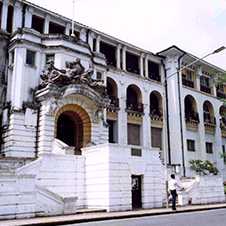 POST WRITTEN BY: Walder Thame (J.D. ’16), Pace Law School
POST WRITTEN BY: Walder Thame (J.D. ’16), Pace Law School
Sierra Leone was embroiled in an 11 year Civil War from 1991-2002 that began as rebel forces attempted to overthrow the government. The consequences were far-reaching and severe: There were deaths in the thousands, amputations, systematic rape, and destruction of homes as well as the forced relocation of thousands to neighboring countries. It was truly one of the most devastating events in modern history. War Don Don, one of the most riveting pieces of work I have seen, documented the trial and conviction of Issa Sesay, following the disarmament of the Revolutionary United Front (RUF) rebel group.
The movie depicted a thought provoking dynamic of the Special Court of Sierra Leone as it adjudicated crimes at the international level. For me, one of the most compelling parts of the film is the role of politics. As I watched, I started to think of the justice system in America, particularly the idea that the courts should be free of influence from other political branches and the notion that the accused should be afforded a fair trial. I don’t necessarily agree with the way justice was carried out in the trial of Sesay, who was the acting commander of the RUF, credited with ordering disarmament and restoring peace in the country.
My contentions rest primarily on the Special Court’s handling of the testimony proffered by prosecution witnesses and the manner in which the Special Court was organized. Some of the witnesses received monetary compensation and even relocation to first world countries for their testimony. I think the defense should have been allowed to inquire deeper into the possibility of bias, and the Court should have accorded weight to each witness’s testimony, based on that possibility. During the trial, defense counsel attempted to uncover bias but the Court stopped it. This I believe was an error since it can be assumed that those who were compensated for their testimony had everything to gain. Sierra Leone is one of the poorest countries in the world. Suffering is immense, food is scarce and prospects for the future are dim. Therefore, it is quite plausible that witnesses who testified had hidden agendas and as such an extensive defense inquiry should have been allowed.
Additionally, I believe that the organization of the Special Court was not ideal. I don’t think the hybrid model was the best way to decide this case. Not only was there destruction of lives and property, there was destruction of the human spirit as some of the survivors lost faith in the compassion of mankind. Based on the heinous nature of the crimes committed, I would expect the Special Court to be comprised solely of international judges. That was not the case however. Instead, as shown in War Don Don, the Court consisted of a mix of domestic and international judges and staff. Consequently, judges presiding over the proceedings had more likely than not first-hand experience or knew someone who was devastated by the alleged atrocities. Thus, I don’t think the defendant was given a fair trial because impartiality was severely compromised. After all, under the black robes and authoritative voices are regular people susceptible to the emotions stemming from great tragedy.
This is not to say that the Special Court lacked integrity or that the defendant was innocent. However, having a panel of international judges would have assured impartiality and increased the integrity of the Court’s decision. Additionally, I believe that the trial was not one marked by accuracy but rather a politically driven engine that desperately needed to hold someone accountable, anyone, even at the expense of not uncovering the whole truth.